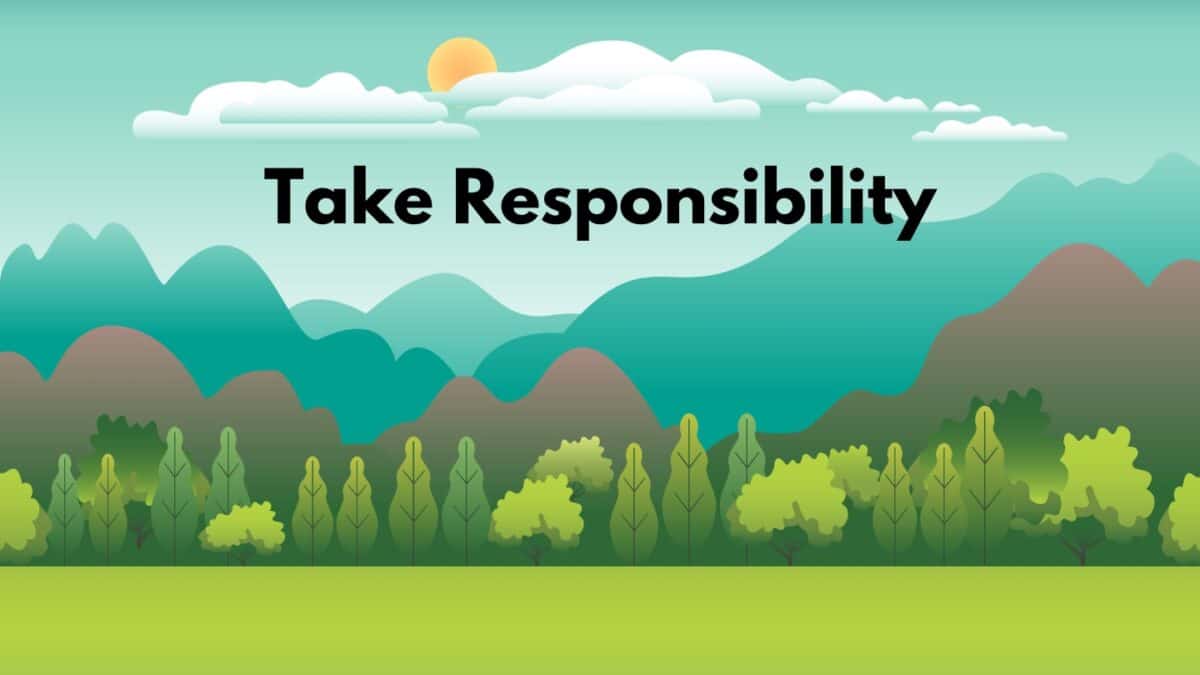Take Responsibility: Be Accountable for Your Life
Take responsibility for your life.
The practice of taking responsibility is a powerful tool for personal growth. It leads to increased self-confidence, self-respect, and a sense of accomplishment.
Responsibility involves self-awareness, owning up to your mistakes, seeking to fix them, and taking proactive steps to influence situations instead of simply reacting to them.
For example, have you ever struggled to own up to something, blame others, made excuses and deny instead of taking accountability?
Well, you’re not alone with this cycle of passing responsibility.
So today I want to cover:
- Understanding and owning up to your involvement in situations.
- How to effectively communicating without being hurtful.
- The benefits of taking responsibility over assigning blame or making excuses.
- How to address potential failures and conflicts proactively.

Take Responsibility By Recognizing and Owning Your Part
Admitting our role in a situation is often unnerving.
Because we’re fearful of the repercussions or we view it as an admission of failure. But recognizing our part, especially when they’ve led to less-than-ideal outcomes, is what taking responsibility is all about.
Taking Responsibility Means:
- You’ve done some genuine self-reflection. Analyzed where things went wrong and found your part in it.
- Owning up to our actions. Because doing so gives you control over the situation, as opposed to feeling helpless or victimized.
- Taking responsibility also means being honest with ourselves and others. We accept our mistakes and the impact they had, without twisting the facts or pointing fingers at others.
It’s about being responsible for everything that happens in your life. Let’s look at a real-life example to clarify the concept.
Imagine you’re working on a project with a tight deadline.
You’re confident about meeting the deadline but unexpectedly, you don’t. The first reaction could be to blame your partner or team members. You might feel like the delay is not your fault but happened because of their inefficiency.
But this is where recognizing your part comes in.
Perhaps you overestimated the team’s capabilities or underestimated the time required for the project.
You didn’t delegate effectively or failed to account for potential challenges that slowed down the progress. Recognizing and acknowledging your part, even if you were not the leader, is taking responsibility.
When we take responsibility, everything else doesn’t matter. Doing so also helps us grow and build better relationships with others based on trust and respect.
Effective Communications Role In Taking Responsibility
Communication is the bedrock of all social interactions.
We use communication to express our thoughts, ideas, and feelings and to connect with others. Often, it’s at the center of any conflict or discord.
A big part of taking responsibility is understanding how we communicate can either reconcile or exacerbate a situation.
Reflecting On The Impact of Your Messages
Recognizing the harm poor communication can cause is a big step in practicing responsible communication. This is where we need to assess the potential harmful consequences of our words before we speak or act.
Being insensitive when delivering a message can do more harm that good, despite your good intentions.
To put this into context, imagine making a critical comment to a colleague on their work without considering their point of view.
Or sending an impulsively harsh response to a confrontational email. These can lead to strained relationships, a negative atmosphere, or declining motivation and productivity.
How to Implement Responsible Communication Strategies
- Identify The Issue: If your message is causing discomfort or hurting someone, it’s time to look in the mirror. Consider how your words or actions may have contributed to the situation.
- Empathetic Listening: Understand the other person’s perspective. This doesn’t mean you endorse their behaviors or actions, but it shows you value their feelings. Doing this encouraging better conversation.
- Use “I” Statements: Instead of using accusatory “you,” statements like “You always make mistakes.” Say something like “I feel concerned when errors like these happen frequently.”
- Offer Solutions: It’s fine to critique or point out issues. But remember to also suggest solutions or ways to improve. This is more helpful and less likely to cause resentment.
- Time Your Communication: Understanding when to have crucial conversations is equally as important as what you say. Avoid discussions when emotions are high and instead pick a time when both parties are calm and open to dialogue.
Effective communication is crucial in taking responsibility, and we often overlook its significance.
Good communication and evaluation of messages create respectful relationships that’re needed for long-term success.
Accountability – Not Assigning Blame or Making Excuses
Human nature has a tendency to shirk responsibility, especially when things go wrong.
We often look for the easiest way out to save face and protect our ego. This, unfortunately, often involves blaming others for our mistakes or making excuses for our faults.
Toxic relationships, lack of personal growth, and unproductive environments can result from this behavior.
Why We Blame Others and Make Excuses
- Blaming others is an age-old evasion of personal responsibility. It harms relationships and makes us weak when we shift blame to others. Some examples include blaming your partner or teammates for missed deadlines. Or associating our shortcomings with external factors we had control over.
- Creating excuses is another way of diverting responsibility. By fabricating reasons for our mistakes, we are refusing to accept our actions and, therefore, refusing to grow from them.
Examples of making excuses are blaming traffic for lateness, technology for missed emails, or lack of resources for poor work.
Accepting Our Faults and Avoiding the Blame Game
To grow personally and professionally, we need to own up to our mistakes rather than blame or make excuses.
- Owning up to our mistakes involves admitting when we are at fault and taking steps to rectify the situation. It showcases humility and honesty, characteristics that deepen our relationships with others.
- This might involve admitting a task was forgotten. Not blaming external factors for low performance, or acknowledging an error in a project.
- Rectifying the mistake illustrates acceptance of responsibility and a commitment to learn. This could involve remembering tasks, improving work processes, or asking for help when dealing with something hard.
Not blaming others and accepting our faults is about personal growth. Because there’s a learning experience from every situation. And this is the essence and richness of taking responsibility.
Life has its ups and downs. Victories and failures.
It’s how we respond to these failures and negative outcomes that determine our growth. I’ve failed so many times in so many ways. But I’ve owned up, responded, and marched on regardless.
Managing Relationship Conflicts Through Responsibility
In relationships, personal or professional, conflicts are inevitable.
The key to addressing them is to take responsibility for your contribution to the issue.
And when relationships falter, there’s often a need to take a step back and evaluate your role in the ongoing conflict.
It’s natural to blame the other party for what’s wrong.
But in doing so, we often overlook our participation in exacerbating the problem. To fix the problem, we need to be open and see how we might have contributed to the problem-challenges.
Take Responsibility Even When Tough Times
Everything won’t go smooth in your life.
Most of us will go through adversity and tough times before the sunshine and rainbows make an appearance. So, we have to take responsibility when the tough times pop up.
Here’s How:
Understand and Accept: You must take responsibility for your role in negative outcomes and failures. Breaking down the situation and identifying what went wrong can help in developing a plan to prevent similar occurrences in the future.
Apologize When Necessary: If your actions or decisions have affected others negatively, owning up to your mistake and offering a genuine apology can help in remediation.
Look for Solutions: Take responsibility by finding solutions to negative situations and minimizing their impact on others.
Learn and Grow: Taking responsibility for negative outcomes encourages your personal and professional development. It offers you a chance to learn and grow.
Conclusion: Embracing Responsibility
In this article, we have discussed how taking responsibility is important in our personal and professional lives.
- It’s essential to recognize and acknowledge your part in any situation, ensuring you don’t blame others or make excuses when things go awry.
- Effective communication is key. Taking care to ensure your message isn’t damaging or hurtful to those involved.
- Avoid deflecting blame or making excuses when you may be at fault. And instead, understand your shortcomings as growth opportunities.
- And to handle negative outcomes and failures with grace and accountability.
Taking responsibility isn’t about shouldering all the blame or failure. But recognizing your contribution and working proactively towards a solution.
It’s about understanding your role within a team or relationship. Stopping the blame game and making necessary improvements. Embracing responsibility leads to a fulfilling life, growth, improvement, and success.
By taking this to heart, we shape our lives and influence those around us positively. Your world can change from your immediate actions.
So step up and take responsibility.






